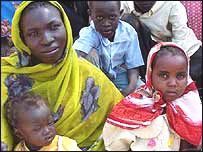Returning Sudan’s stolen children
By Jonah Fisher, BBC News
SOUTHERN SUDAN, Mar 23, 2005 — Abouk Koul was just five years old when she was taken from her village in South Sudan and carried away to work as an unpaid domestic servant.
“The Arab raiders came in the afternoon to our village and attacked,” she said. “People ran but I was surrounded and taken on the back of a camel.”
The Sudanese government and the United Nations call the thousands of people like Abouk “abductees”, but southerners call them modern-day slaves.

|
|
Abouk was married off to one of her master’s relatives. (BBC) . |
Whether abductees or slaves, after the 20-year conflict between Sudan’s Arab north and black African south formally ended three months ago, people like Abouk are being rescued and sent back home – if they can remember where that is.
Throughout the 1980s and 1990s, Arab tribesmen raided ethnic Dinka villages in Bahr al-Ghazal state, snatching children from their homes and taking them back to the north.
Abouk was taken to an Arab home in Darfur where she was made to work taking care of cattle and cleaning the house.
When she was 18, her master married her to one of his relatives and she has two half-Arab children Fatima and Khadija.
‘Sugar-coated slavery’
A boy who says his name is Majok Zeman is sitting near Abouk.
He is deeply mentally disturbed and can hardly speak.
Through a broken voice, he says he was tortured and castrated by his Arab masters.
Both Majok and Abouk have been brought to the south by a Sudan government organisation called the Committee for the Eradication of Abduction of Women and Children (CEAWC).
Abouk does not know anyone in the south, just the name of the village she came from.
Majok knows nothing. He will have wait here for village elders to visit in the hope that one of them will recognise him.
The British-Kenyan Rift Valley Institute says more than 10,000 people like Majok and Abouk were taken from their homes.
“It’s sugar-coated slavery,” says local administrator Bona Makuak Mawien.
“What is it when you hijack someone and keep them somewhere or force them to marry or take a creed that is not their choice? All these abductions boil down to slavery.”
‘Liberated’
Campaigning groups such as Christian Solidarity International have called it slavery as well.
Their attempt at solving the problem by buying back Dinkas for $50 each was criticised for encouraging corruption and even leading to more people being taken.
With the coming of peace, the raids have stopped and the government has tried to rectify the problem through CEAWC.
Their idea was that officials would find abducted Dinkas, force their masters to surrender them and then truck them back south to their homes.
Having lived almost all their lives in the north, most of the returning Dinkas know nothing but the name of the village they came from.
Some like Majok don’t even know that. Others such as Yuma Amdan are not happy to be back.
Trucked back south a year ago, she speaks Arabic and precious little Dinka.
Struggling to make ends meet brewing tea in the market, she is surrounded by the four children she had with the Arab man she was “liberated” from.
“I haven’t been able to find any relatives so I just stay here in the market,” she said.
“It’s miserable. I live alone – no father, no husband. I would like to go back north but they won’t let me – they say I belong here now.”
‘Dumped’
Yuma has been returned to one of the poorest places on earth. Life expectancy is just 42 and infrastructure non-existent.
Initially, the United Nations supported the Khartoum government’s policy of returning abducted people.
But as the number of cases like Yuma’s mounted, they asked the government to stop.
Manuel Aranda Da Silva, the head of the UN’s humanitarian operations in Sudan, said support was withdrawn because some of the returns hadn’t been voluntary and that they were being “dumped” in the south without any help to begin a new life.
The return of more people like Abouk, Majok and Yuma has now been suspended until the end of April.
The UN, together with the Sudanese government, are taking a closer look at what to do now.
Rectifying one of the great evils of Sudan’s long civil war is proving to be almost as hard as stopping the fighting itself.
